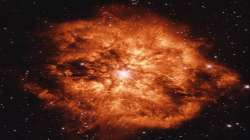Indian astronomers trace rare supernova explosion to Wolf-Rayet stars
The rare Wolf-Rayet stars are highly luminous objects a thousand times that of the Sun and have intrigued astronomers for long, the Union Ministry of Science and Technology said in a statement on Tuesday.

Tracking a rare supernova explosion, Indian astronomers have traced it to one of the hottest kind of stars, called Wolf-Rayet stars or WR stars. The rare Wolf-Rayet stars are highly luminous objects a thousand times that of the Sun and have intrigued astronomers for long, the Union Ministry of Science and Technology said in a statement on Tuesday.
They are massive stars and strip their outer hydrogen envelope which is associated with the fusion of helium and other elements in the massive core.
Tracking of certain types of massive luminous supernovae explosion can help probe these stars that remain an enigma for scientists.
A team of astronomers from the Aryabhatta Research Institute of Observational Sciences (ARIES) in Nainital, along with with international collaborators, conducted the optical monitoring of one such stripped-envelope supernova called SN 2015dj hosted in the galaxy NGC 7371 which was spotted in 2015.
They calculated the mass of the star that collapsed to form the supernovae as well as the geometry of its ejection, according to the study published in The Astrophysical Journal.
The scientists also found that the original star was a combination of two stars -- one of them is a massive WR star and another is a star much less in mass than the Sun.
Supernovae are highly energetic explosions in the universe releasing an enormous amount of energy.
Long-term monitoring of these transients opens the door to understand the nature of the exploding star as well as the explosion properties.
It can also help enumerate the number of massive stars.